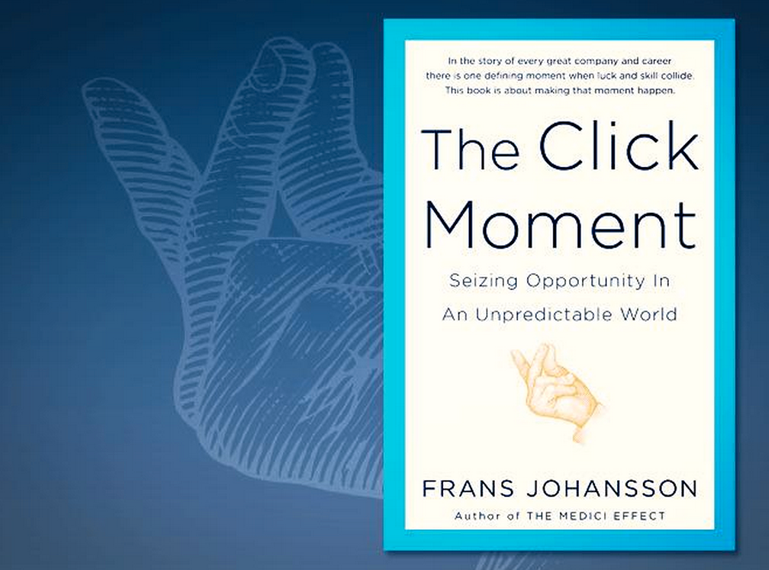“The biggest factor of sucess is… randomness, chance and serendipity.”Frans Johansson
“The Click Moment” is one the best two book about success that I read in the last two or three years – the other one is “Smartcuts: How Hackers, Innovators, and Icons Accelerate Success” by Shane Snow. In a nutshell, what is “The Click Moment” about? Fundamentally, the book revolves around two main points: Firstly that success is in great part, the result of randomness. Secondly, it describes what to do to take advantage of randomness. The author of the book is Frans Johansson an author and entrepreneur born in Sweden. He has BA in Environmental Science from Brown University and an MBA from Harvard Business School. His previous book, entitled “The Medici Effect” was translated in 17 languages and was one of the “Best Books on Innovation” according “BusinessWeek”.
The Medici Effect explains how the intersection is the point where established concepts meet, connect, clash and combine. The innovations occurring in that intersection is what Johansson calls “the Medici effect”, referencing the Medici family, an Italian Renaissance family that sponsored creators from various areas such as Michelangelo.
In “the click moment” Johansson mentions that success leaves clues. However, those clues are less than most people think. Part of the reasons for success today don´t produce the same effect tomorrow
The author fights the popular idea (fostered by authors such as Malcom Gladwell) that says that10 thousand hours of practice will make you succeed in all kind of areas. He argues that the practice rule only works in areas where the rules for success are stable ones. That is the case of how to play tennis or chess. The author exemplifies his idea through the story of the Williams sisters and Polgar sisters. The first ones played tennis and the second ones chess, due to the effort of their respective fathers, who planned their success from birth. Franz Johanson opinion is that to practice a lot can actually be a complete waste of time and resources. Why? Because in certain areas, the “rules” of success change fast. The example he gives is Nokia. Even though a decade ago Nokia was the “king” of mobile phones industry it lost its importance because it failed to quickly understand how smartphones were disrupting the rules of an established market.
Obviously, this doesn´t mean that practice doesn´t has its important role for achieving success. Simply, one should take into account how success is in great part, the result of random forces. Johansson narrates various stories of companies that were able to succeed because they didn´t know the “rules” of the game they were playing. One of those examples is the writer Stephanie Meyer who wrote the very successful “Twilight” vampire books. Supposedly, beacuse Meyer didn´t know basic facts about vampires, as for example that they can only walk at night, she ventured to innovate in her stories. The vampires from the Twilight” books can walk during the day and some attend high school. The author agrees that not following the acceptable “rules” isn´t a guarantee for success: many times it isn´t. But anyway it is worth a try to be innovative, as Johansson explains, in the following lecture, given to students from University of Richmond.
Most of the book is about how to invite randomness into our lives in other to take advantage of it. By other words, how to create click moments (“click moments represent a sudden opportunity, a turning point that can push us in a new, unpredictable, and random direction. Those moments are powerful because they allow us to stumble upon new ideas that are not obvious or logical – creative ideas that may enable us to outwit our competitors.The book is full of suggestions on how to profit from randomness that can be used both by individuals and companies.The suggestions are divided in two broad groups: The first provides recommendations on how to spot click moments and the second one how to produce them.
Overall the book provides readers with useful information that can be used almost immediately in their lives.
Ivo Dias de Sousa is a Portuguese writer born in Mozambique. Ivo is also a Professor at Universidade Aberta, Portugal, giving courses on information management. Currently, Ivo is interested in using his experience on information management to construct applications (see http://windit-app.com/ ) for smartphones, in collaboration with others. Ivo holds a Master in Statistics and Information Management (Universidade Nova de Lisboa) and a Ph.D. in Information Management (Universidade Aberta). Amongst his main interests are information management, psychology of luck and literature.












